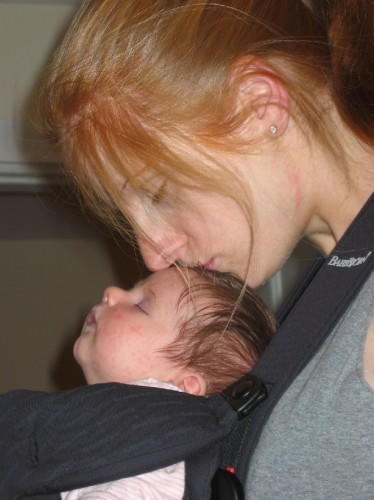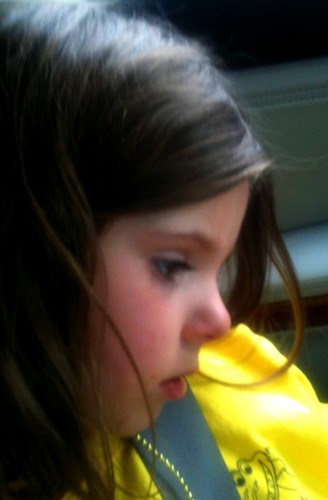(apologies for reposting, this got inadvertently deleted and I care about this post so wanted it back on the site – I am so sorry to have lost all of your thoughtful comments!)

you probably can’t tell, but the curtain has already come down around me (late fall 2002)
After Terresa honored me by interviewing me at her blog, the Chocolate Chip Waffle, we started talking about how we had both experienced PPD . She pointed me to her beautiful post, PPD Sisters, and prompted me to write about my own experience with post-partum depression. My first reaction was to think of my own PPD sister, who I wrote about last fall. But I’ve thought a lot this weekend about Terresa’s nudge, and wondered why it is that I refer often to my PPD, but I almost never write specifically about it (at least not here).
Part of it is that I have so few memories of those actual weeks. It’s fascinating the way the mind recovers and copes, isn’t it? My memory has smoothed over those weeks of tears and panic like the airbrush facility in photoshop: the pain is still there, I can’t forget it, but its pointy, prickly granularity is sanded down to a more general, uniform memory. So I strive to remember specific moments, but I mostly can describe the overall experience. In my letter to my friend, I referred to the crucible of bewilderment, fear, and wonder known as postpartum depression, and I still think that’s a pretty good summary.
What do I remember about those first days and weeks? I asked myself this anew after Terresa asked about it. I remember a blur of tears, darkness, crying, and most of all a visceral, frantic sense that I had made the biggest mistake of my life. This fear was powerful enough to almost topple me: the panic that I had ruined my life was layered with the guilt for having those feelings in the first place in an incredibly toxic cocktail. I remember walking one raw, early-November afternoon, Grace strapped to my chest in the baby Bjorn, my hand almost freezing off as I held a phone to my ear (one of very few phone calls in those days) and cried to a poor, unsuspecting friend who was expecting a joyful new mother. I remember sitting in the rocking chair in my kitchen, a week-old Grace asleep on my knees, wondering numbly why it was that my doula (there for her postpartum visit) was looking at me so oddly, why she kept urging me to call my midwives, why she took Matt into the other room and whispered something to him.
It all came crashing down at my 2 week midwife check-up. I am still horrified that most women have to wait until 6 weeks for their own appointments after giving birth, and am intensely grateful that my midwifery practice mandated this 2 week appointment. I sat across from the midwife, Grace asleep in her bucket carseat, and dissolved into tears. I remember crying with those all-encompassing sobs that make you feel like you are drowning. I could barely breathe. I was not allowed to leave until the end of the day, at which point I left with prescriptions and therapist appointment cards clutched in my hands and a dawning sense that I was truly not okay.
I have heard many funny stories of how control-fanatic women like myself struggled to adapt to motherhood. I always laugh, but the truth is that my reality was different. I crashed off the cliff of depression so quickly and so utterly that I was not even trying for control (for the first time in my life?). I didn’t even care, which was for me much scarier. I just sat there and cried. I think the fact of my surprise pregnancy contained within it the seeds of my PPD: I had never been in control of this, not from the very beginning. I, who have been able to muscle my way through basically any challenge (mostly because I was good at only selecting those challenges that I could conquer), was completely undone by this 7 pound, 12 ounce baby, and it devastated me.
My body fell apart as rapidly as did my mind: within 2 weeks I was 10 pounds thinner than I had been pre-pregnancy. I did not sleep, I did not eat, I did not smile. I looked like a cadaver, with deep circles under eyes that would not stop crying. I would not talk to anyone; the phone rang and rang and I refused to pick it up. Now I see I was recoiling into the deepest recesses of my body and spirit, trying to physically hide, to pretend somehow that this was not happening.
I tried reasoning with myself. I had had the unmedicated delivery I wanted so desperately, despite it being long and arduous. How could I have survived that experience, whose pain was fresh and blinding, and not be able to bear this? I had delivered a daughter, the gender of child that I’d never even allowed myself to admit how much I wanted. How could I not be grateful? In the face of such a thick, inarticulate fog of despair, whose power felt primal, logic absolutely failed. I could not see past the storm clouds either in my heart or on the horizon (and there were many there, too: an economy in collapse and a terminally-ill father-in-law awaiting a heart transplant).
I admit that for all of my pretense at open-mindedness, I had always thought that people who took anti-depressant medication were simply not trying hard enough. That arrogance disappeared overnight when I swallowed my first zoloft. Grace’s arrival was my hint – and, frankly, it was more like a sharp slap to the face, since I seemed to have trouble hearing the hints – that trying hard was not always going to be enough.
My recovery was gradual. If I plunged off a cliff in a near-vertical line when Grace was born, I climbed out on an angle just north of horizontal. I got significant help. I saw more than one therapist, frequently. I took medication. I can’t remember a specific day that I looked at my daughter and felt the swell of pleasure, of joy, of love that I had expected when she was born. It did happen, though I hate that I can’t note a specific day that those feelings arrived, and I love her fiercely now.
The truth is that I expected motherhood to be simple. I had been told that it would be instinctive, that I would look at my baby and realize I’d always been waiting for her. I didn’t. While I’ve spent my life working for specific achievements, I think I thought that this one thing, being a mother, was my birthright. It wasn’t. I am dogged by a profound guilt about those early days. I ask myself all the time what kind of damage my ambivalence did to her and to our bond. My passage to parenthood was marked by a deep grief that is integrally woven into my identity as a mother.
I delivered Grace myself, pulling her onto my chest with my own two hands. From that moment I began a long and difficult passage to the grace of motherhood. It did not come easily to me. I’ll never know if this has made me a more confident mother, for knowing the treacherous shoals I traversed, or a more insecure one, for the lingering knowledge that I did not embrace my child immediately. I try to tell myself it doesn’t matter now.


